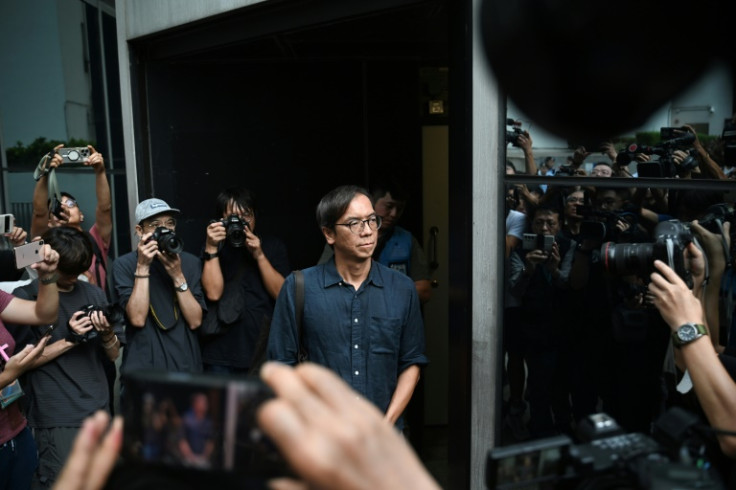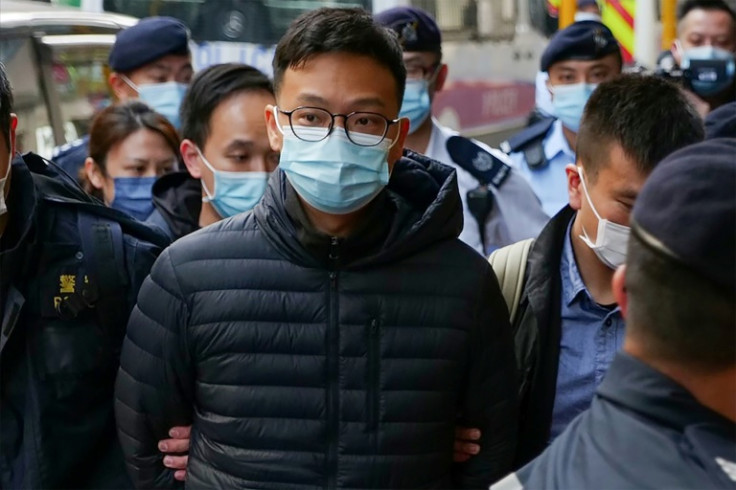
When sedition charges against Hong Kong news editors Chung Pui-kuen and Patrick Lam were first read out in court, former employees of the now-shuttered Stand News broke down in tears in the public gallery.
The courtroom in the landmark trial became a battleground for debate about the merits and limits of press freedom in Hong Kong.
The former British colony once boasted one of the freest media environments in the world. But after Hong Kong saw pro-democracy protests in 2019, an ensuing government crackdown and the enactment of security laws have effectively quelled dissent.
"It was like a humiliation," recalled a former Stand News reporter who did not want to give his real name -- as with all other ex-employees who spoke to AFP in the months following the trial that began in October 2022.
"We were all very emotional and cried when we heard the allegations."
Similar scenes unfolded Thursday after Chung, 54, and Lam, 36, were found guilty of "conspiracy to publish and reproduce seditious publications".
Their Chinese-language website gained prominence for its coverage of Hong Kong's pro-democracy protests, with its reporters often livestreaming events before authorities quashed the movement.
By late 2021, police raided Stand News offices and froze its assets under a sweeping security law.
Another former employee, who worked there for three years, burst into tears on Thursday when a defence lawyer read out a letter penned by Lam after the verdict was announced.
"We documented Hong Kong as best we could, trying to leave a first draft of history before these people and events disappeared," wrote Lam, who was not present in court due to illness.
"The only way for journalists to defend the freedom of the press is to report, just like everyone who is still holding fast to their posts today."
The teary reporter, who now works for a different publication, said Lam's letter "really hit my heart".
"He was trying to remind us what values and principles we should adhere to," he told AFP after the ruling.
"The very simple essence of being a journalist is to keep reporting."
Hong Kong was once known for its freewheeling media scene, a sharp contrast to mainland China which remains one of the most oppressive places for journalists worldwide.
Thursday's verdict made Chung and Lam the first journalists to be convicted under a colonial-era sedition law since the finance hub was handed over to China in 1997.
Prosecutors cited the outlet's interviews with pro-democracy activists and op-eds critical of a security law imposed by Beijing in 2020 as proof of sedition, but during the trial, Chung defended the decision to publish diverse viewpoints.
Former Stand News employees attending the trial saw their work dissected by prosecutors for any hint of sedition.
One columnist said he realised it was dangerous for journalists to question the security law, which prompted further self-censorship across the industry.
"The overall strategy was to muddy the waters, so as to keep (the media) guessing."
Another former reporter said she felt enraged watching prosecutors use "absurd excuses to shut down and delete our work".
In the end, she decided to quit journalism.
"I don't want anyone else to pay a high price for what I wrote," she said.
For some, the parrying Chung did on the witness stand sent a message.
"The real audience was the public," an ex-Stand News features writer said.
"In terms of conveying his views on independent media and how it used to exist in this society, I think the message was delivered."
Media researcher Carol Lai, who attended the verdict on Thursday, agreed.
"The trial is not just about them but about the whole industry... It's very depressing, but (Chung's testimony) gave me a lot of positive inspiration."
After he and Lam were granted bail pending their sentencing next month, Chung left the court to face a sea of reporters.
He paused briefly for photographers, then left without saying a word.
But in a letter submitted to court by his lawyers post-verdict, Chung said many Hong Kong journalists, including his former employees, were "determined" to stay in news.
"Some (Hong Kongers) are so concerned about the freedom and dignity of the people in their communities that they are willing to pay the price of losing their own freedom. It is the inescapable responsibility of journalists to faithfully record and report."










